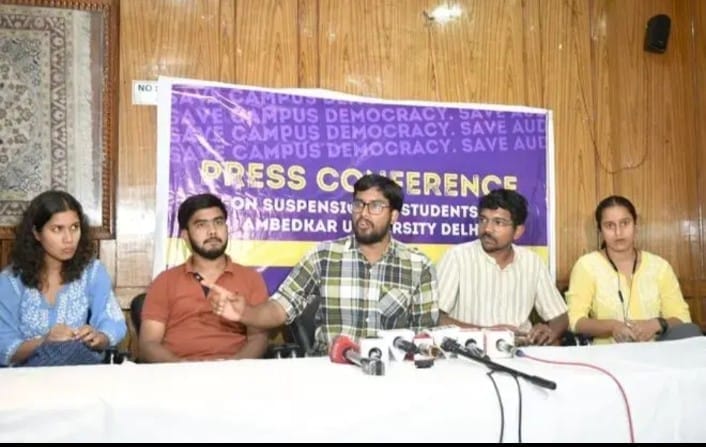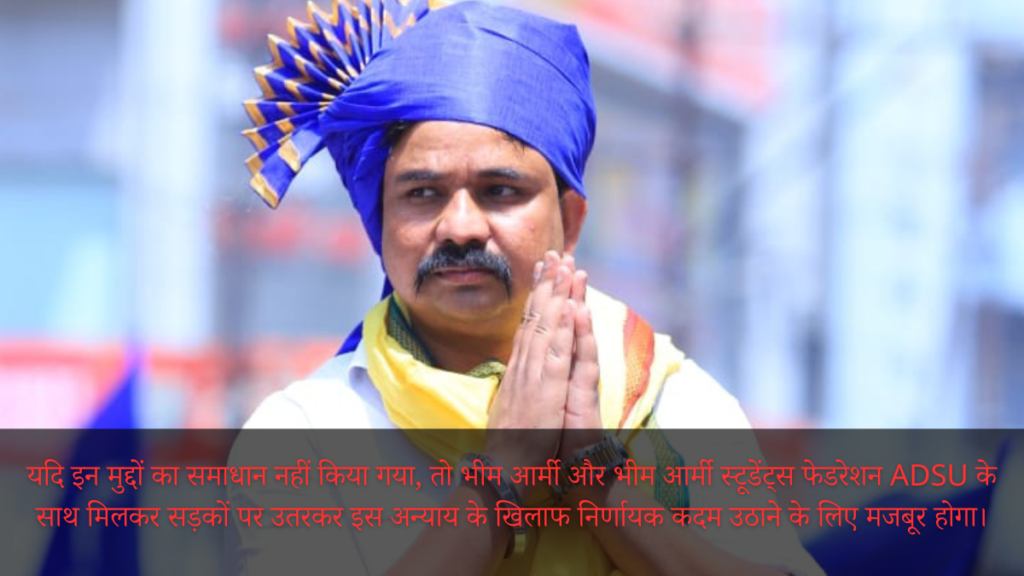With suspensions, show-cause notices, and barricades, the administration seems more invested in silencing students than in nurturing academic inquiry.
In just the past two months, Ambedkar University Delhi (AUD)-which falls under the Delhi government-has suspended around 17 students and issued a show-cause notice to an associate professor.
These actions have raised widespread concern, with many seeing them as part of a broader clampdown on dissent, resembling developments at other institutions such as Jamia Millia Islamia. Like Jamia, according to reports, AUD’s campus has become increasingly securitised, with heightened police presence, barricaded entry points, and tighter scrutiny of movement and identity verification.

if you are interested, go and read here:
On April 11, students protesting and observing a hunger strike were allegedly met with a violent crackdown. Videos circulated on social media show female students being dragged and manhandled by male guards. The protest followed the March 6 suspension of 11 students in connection with an alleged ragging incident.
While most have since been reinstated, three students-Nadia, Harsh Choudhary, and Anan Bijo-affiliated with the Students’ Federation of India (SFI), continue to face disciplinary action. On April 12, five more SFI-affiliated students received suspension letters. The university cited their involvement in “obstructing official duties, attempting assault, and endangering safety” on campus. These selective actions have triggered allegations of political bias and attempts to suppress dissent.
Nadia, a first-year master’s student in development studies, said her suspension cited “tarnishing the university’s image”. She believes the real reason is her student activism. “The university called my parents, and when my father met the Vice Chancellor, she cited ‘general indiscipline’. But my suspension letter accused me of ‘intellectual property theft’ and ‘twisting facts’-claims that are baseless. We’ve taken legal recourse, and the case is now in the Delhi High Court,” she told Frontline.
Shefali, secretary of the SFI’s AUD unit, said the administration has shown no interest in dialogue, despite repeated attempts. “The faculty stands with us-many professors are extending support individually. This is no longer just about Nadia, Harsh, or Anan. It’s a collective struggle to uphold democratic values on campus,” she said. The three students remain under suspension, with no engagement from the administration.
Mantasha, a final-year MA student, said that her suspension disrupted her dissertation work. “I was debarred from campus access while I was in the midst of research. I lost contact with my mentor and couldn’t proceed with fieldwork. A six-month suspension at this stage effectively means losing a year,” she said. Mantasha, a member of the All-India Students’ Association (AISA), had emailed a statement criticising the Vice Chancellor’s Republic Day address.
Students allege that the VC remarked that B.R. Ambedkar should be seen as a national figure and accused the Dalit community of “miniaturising” his stature. They also claim she praised the Ram Janmabhoomi movement, calling it a 525-year-old issue. “I was asked to submit an unconditional apology but refused. Two weeks later, on March 21, I received my suspension letter,” she said.
Clampdown on academic freedom
Following her suspension, students staged an indefinite protest outside the administration office. Saiyed, a final-year MA student and AISA’s AUD unit secretary, said it was unprecedented for someone to be suspended simply for expressing dissent. “It was an aggressive move. Mantasha’s parents were summoned, and hard copies of her suspension letter were sent home. Barricading intensified, and police presence-both in uniform and plain clothes-increased sharply,” she said. Following nearly two weeks of protests after which the students went for an indefinite sit-in, her suspension was revoked on April 4.
A faculty member of the Global Studies programme received a show-cause notice after speaking at a public event in support of the students. In his speech, he urged the administration to revoke the suspensions, calling them excessive and damaging to academic freedom. The administration accused him of violating institutional protocol, which many viewed as an attempt to intimidate faculty showing solidarity.
“The administration seems to be replicating the Jamia model: suspensions, barricades, faculty terminations, and a sustained assault on student voices.”SaiyedAUD unit secretary, AISA
In his written response, accessed by Frontline, he noted that at least six suspensions issued on March 6 were not recommended by the Proctorial Board, raising questions about procedural violations. He said he felt compelled to speak out against these actions, which he deemed disproportionate and procedurally flawed.
Frontline contacted the AUD administration but received no response.
The Ambedkar University Delhi Faculty Association (AUDFA) has issued statements in solidarity with the students, calling on the administration to resume dialogue and remove campus barricades restricting access.
‘Arbitrary and vindictive’
Faculty members have also faced administrative backlash. On November 5, 2024, two senior professors-Salil Misra and Asmita Kabra-were abruptly dismissed. The administration cited “procedural lapses” during their tenures in 2018 as Pro Vice Chancellor and Acting Registrar, respectively, regarding the regularisation of 38 non-teaching staff. The dismissals triggered strong protests from both faculty and students, who called them arbitrary and vindictive.
A senior professor and AUDFA member, speaking anonymously, described an atmosphere of growing repression. “Voices that challenge caste- and gender-based harassment or advocate for progressive causes are being targeted. Faculty careers are also under threat-some professors were terminated last year, and others now face possible demotions. Promotions from nearly a decade ago are being reviewed. The environment has become one of fear and uncertainty,” they said. “We teach our students about free speech, but when they exercise it, they face punitive action.”
Many allege the university is now run by a small group of individuals who hold multiple influential positions across departments and committees. This concentration of power has raised concerns about the erosion of transparency, accountability, and democratic governance.
Saiyed sees the recent developments as part of a broader effort to silence dissent. “Since the BJP came to power in Delhi, the AUD administration seems increasingly authoritarian. The dismissal of professors Salil Misra and Asmita Kabra signalled that progressive voices were under threat. That fear has only grown with the suspension of nearly a dozen students-despite the proctoral committee reportedly not recommending such action. The administration seems to be replicating the Jamia model: suspensions, barricades, faculty terminations, and a sustained assault on student voices.”


